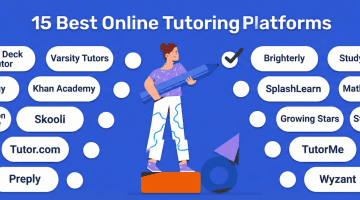Advantages And Disadvantages Of Online Learning
reviewed by Jo-ann Caballes
Updated on July 2, 2025
The digital age ushered in an education revolution when online learning became a common option treated equally with traditional options. Its flexibility and accessibility allow kids to study math anywhere.
In this article, we’ll delve into the advantages and disadvantages of online education, unraveling its specifics. After reading it, you’ll be equipped with the knowledge to navigate all challenges and make online education your family’s tradition.
Study online with Brighterly
Brighterly offers a unique online learning platform specialized solely in math tutoring. While general online learning platforms provide a wide range of subjects, we focus solely on math education. This singular focus allows us to:
- Develop a highly-tailored curriculum for each student.
- Embrace the power of play-based learning.
- Provide you with only the best math tutors with certifications, allowing them to work with students with special needs.
- Offer a supportive environment.

While online learning still has advantages and disadvantages, tutoring specialized in a single subject has the best pros ratio. It’s still flexible and cost-effective; tutors can provide a variety of study approaches while improving students’ time management and self-discipline.
Advantages of online education
Online education advantages are countless. It has transformed the way people learn, providing an easy and convenient way to study literally anywhere you want. Check this list of online learning benefits:
- Studying at your own pace. Students can progress through the course at their own speed.
- Flexible scheduling. Your kid can easily balance education and other commitments.
- Study from anywhere. One of the most significant advantages of online learning is that your kid can study anywhere, from their favorite couch to the Santorini vacation with you.
- Accessibility. Online studying can accommodate the needs of every student, including those with disabilities.
- Fits different learning styles. Tutors can offer formats that suit your kid the best. They can play games, watch videos, or create quizzes.
- Reduced expenses. No commuting costs, textbook expenses, or campus housing fees.
And it’s just some of the positive effects of online learning. This study practice can also improve students’ self-motivation, as remote studying requires strong time management and organizational skills.
But to be fair, we want to show the advantages and disadvantages of online classes. Remote education isn’t a placebo, and you should understand that. That’s why we’ve gathered the potential struggles of this approach.
Disadvantages of online learning
Online study’s disadvantages are less concerning than you may think. While online education offers many advantages, it also comes with challenges. Let’s examine the potential disadvantages of online classes:
- Limited social interaction. Socialization is crucial. If your child doesn’t have outside activities, they will lack human interactions.
- Isolation and loneliness. Some students may feel disconnected from the learning community.
- Potential problems with equipment. You should be constantly connected to the internet and have devices with great cameras.
- Steep learning curve. Students may need time to adjust to online platforms and tools.
Online education requires strong time management. Students should be motivated enough to stay on track without a strict school schedule, so they should know how to fight procrastination even when they want to relax.
10 advantages of online classes
- Flexibility
- Convenience
- Cost-effectiveness
- Multiple study approaches
- Improved time management
- Enhanced technical literacy
- Global learning community
- Environmental benefits
- Accessibility
- Focus and self-discipline
Flexibility
As we said earlier, the student can study at their own pace. It especially fits “night owls” who don’t like to get up early. The kid can start to study at their own pace and develop a schedule that fits their lifestyle.
While traditional school forces the whole family to wake up to send a kid to study, online education provides freedom of choice
Those benefits of online learning especially suit those who can’t study daily. In that case, a child can take a few days off to squeeze the material later.
Convenience
Your child can access classes from anywhere with an internet connection. They can take classes in their room, at the competitions backstage, or with you on your overseas vacation. The possibilities are endless.
For as long as your child meets all deadlines, they can study everywhere
Cost-effectiveness
Online education is generally more affordable than traditional private school education. Digital schools can save on operational expenses. Also, you don’t need to think about commuting or using school buses.
Penny here, penny there… And there you’ve got your own emergency fund
One of the greatest benefits of online courses is that they can accommodate more students without significantly increasing costs, leading to potential tuition reductions.
Multiple study approaches
In brick-and-mortar education, you need to stick with the stuff that the school provides, but you can choose anything and anyone you want online. One of the greatest benefits of taking online classes is the ability to work with anyone, from high school students to the Harvard professor. Your child can also change tutors until they find “THAT ONE” who seems like a match made in heaven. Students can freely choose between learning paces and levels of difficulty, allowing for personalized learning experiences.
With a proper approach, even kitty can become a math genius
Improved time management
Online studying can significantly boost a child’s time management skills. Students can create study plans that align with their personal and professional commitments. Moreover, by eliminating commutes, students can optimize their study hours.
After a few years of online education, your kid becomes time management genius
Enhanced technical literacy
Online studying has become synonymous with technological integration. By constantly working online, your child will achieve digital proficiency and learn digital communication skills that will benefit them throughout adulthood. Advanced tech literacy is known as one of the major benefits of online education.
Students often use various tools, such as word processors, content creation tools, spreadsheets, presentation software, and online research databases. They will use the same tools during college and university study, so they will have more experience than their traditionally educated peers.
With online education, your kid will boost their tech literacy to sky-high levels
Global learning community
Online education fosters a global learning community, breaking geographical barriers and connecting students with diverse backgrounds. This tremendous networking is known as part of online class benefits. Remote students can study with students from different parts of the world, exposing themselves to other worldviews and values.
Environmental benefits
You can forget about communing and waiting for the school bus to arrive. One of the greatest advantages of taking online classes is that students don’t need a daily commute. It not only saves time but also reduces greenhouse gas emissions.
Online courses often use digital textbooks. It also benefits the environment, as your child doesn’t use paper as much as their peers.
Online education even benefits the environment!
Accessibility
The digital world makes education accessible even for kids with special needs. If they need to lie down right in the middle of the study session, no one judges them.
Remote study suits families living isolated areas. You can pick any tutor you want, not just settle for teachers in your city.
Your kid can be safe, as no one judges them during online studies
Geillan Aly, founder and CEO of Compassionate Math, also likes the accessibility of distance education. Here are her points of view on online classes’ advantages and disadvantages:
“With online education, students will get immediate feedback on why their answers are correct or incorrect.”
But, I found that many students learn to “game the system” by figuring out how to answer the computer's wants without understanding the concepts behind the question. Unfortunately, this means that although the student can look like they are successful, they might just figure out how to “hack the prompt”. And it raises concerns, as it has long-term consequences for the student's mathematical understanding.
Focus and self-discipline
Online learning significantly contributes to the development of focus and self-discipline. Those students have minimal distractions, which may benefit neurodiverse learners since many ADHD folks tend to be distracted in traditional classrooms.
Online education boosts a child’s self-discipline. They are the only ones responsible for their grades. Just like in college
Navigating technical difficulties and managing time independently builds resilience and self-discipline. By demanding self-motivation and time management skills, online learning empowers individuals to become more focused and disciplined.
Why is online learning bad?
While some say that online learning is bad, we can tell that it’s challenging but worth it. Students may lack in-life interactions, but they still network with other students online. After school, they can create a Discord chat to play games together.
Deep tech involvement is considered both as pros and cons of online learning. While it provides a sense of deep tech literacy even to elementary school kids, reliance on technology can result in study disruptions. Especially if students and teachers live in areas with regular outages without a PON internet connection.
Unequal access to technology can create disparities among students. While some students may have the latest gaming laptops and powerful computers, others may have just a phone or a tablet. To reduce the disadvantages of online classes, ensure that other kids in the class have a similar financial situation.
Allowing students to form their schedule can be counted as online learning pros and cons. The absence of a structured classroom environment can make it challenging to stay motivated and focused. To mitigate this, create a dedicated study space and establish a routine to enhance focus and productivity.
Dr. Richie Romero, Deputy Superintendent at California Online Public Schools, supports the “everything has two sides” approach, considering the pros and cons of online education and criticizing old rigid learning styles:
“Education was never meant to be one-size-fits-all, and unfortunately, traditional brick-and-mortar schools continue to face challenges that impact effectiveness.”
Online education is a powerful alternative that offers several advantages. Especially for students with unique needs. This approach is flexible and accessible.
Two core benefits of online education include flexibility and accessibility. Students can access course materials at their own pace, providing them autonomy, which is a key motivator for children.
It can be difficult for some students and families to adjust to at first; however, with self-motivation and family engagement, students can be quite successful in an online atmosphere.
What is one advantage and one disadvantage of online learning?
The main advantage of online learning is the flexibility, while the main disadvantage is the lack of face-to-face interactions.
Online learning shines in its ability to cater to diverse needs. Students can access courses from anywhere with an internet connection. Online platforms break down geographical barriers, allowing students in remote locations or with mobility limitations to access high-quality education.
While online learning offers numerous benefits, being aware of its limitations allows parents and students to develop strategies to maximize its effectiveness and create a successful learning experience.
We, at Brighterly, understand the benefits and drawbacks of online learning. That’s why we provide tailored care to mitigate all potential disadvantages, improving students’ productivity while keeping their mental health!
Caitlin Runne-Janczy, Chief Academic Officer at Science Interactive, share with us her thoughts about online learning advantages and disadvantages:
“Online studying increases access to education and provides personalized learning practices.”
The combination of new technologies has the power to transcend traditional constraints, making education -- especially science-based education – more accessible and flexible.
Meanwhile, it is still challenging. Without real-life social interactions and campus life, online students may start to feel isolated. It can lead to decreased motivation and potential decline in mental health and academic performance. Modern technologies, like VR and games, can lower the social anxiety. Students may gather in game to see the web avatars of their peers.
Wrapping up: figuring out the pros and cons of online classes
Online learning has revolutionized education, offering many possibilities for students and parents. With its flexibility, accessibility, and potential to foster a global learning community, it’s no wonder many are turning to online platforms for their educational needs.
However, it’s essential to acknowledge the advantages and disadvantages of online classes. The most common cons of remote education are lack of face-to-face interaction, technical difficulties, and the need for strong self-discipline. By understanding these challenges and implementing effective strategies, students and parents can maximize the benefits of online learning.
If you’re a parent seeking to nurture your child’s STEM potential, take the first step towards unlocking their full potential. Book a free tutoring session today and let our expert tutors assess your child’s needs.
















